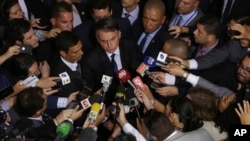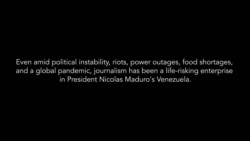Latin American leaders are trying to discredit journalists by accusing them of disseminating fake news or being elitist and out of touch, media rights experts say.
As the region contended with political unrest and mass protests last year, followed by the coronavirus pandemic, the harassment ramped up. The highest levels of power frame the press "as part of the opposition,” Edison Lanza, special rapporteur for freedom of expression of the Inter-American Commission on Human Rights (IACHR), told VOA.
Negative rhetoric about the press is a “constant” in countries like Nicaragua and Venezuela and have become "systematic practice" in Brazil and El Salvador, according to a report by IACHR, part of the Organization of American States.
"It’s worrisome because it generates harassment of journalists by the public. Many people ... do not understand what a critical role is played by the press," Lanza said.
“Fake news,” and “fifi” (elitist) are among the terms that leaders, including Brazil’s Jair Bolsonaro, Mexico’s Andrés Manuel López Obrador and El Salvador’s Nayib Bukele, have used to describe the press.
Journalists have been harassed and attacked by protesters and members of the police and military in Bolivia, Chile, Ecuador and Haiti, according to the IACHR and the media watchdog Committee to Protect Journalists (CPJ).
With the coronavirus pandemic, news outlets are reporting on a global crisis in countries where they have been threatened over their coverage of the outbreak, or where governments have questioned their work.
"Unfortunately, this pandemic comes at a time when we are seeing a certain type of global movement toward authoritarianism," Natalie Southwick, head of Central and South America for CPJ, told VOA. “In emergencies, truth tends to be the first victim."
The situation for Latin America’s press is being played out globally, with officials retaliating against critical reporting by accusing the media of spreading “fake news” or threatening and jailing critics and opponents.
The pandemic has accelerated the decline in press freedom globally, as authoritarian leaders use emergency measures to further crack down on independent reporting.
In Venezuela, the media have been harassed by President Nicolás Maduro’s government, and several journalists have been arrested for their coverage of the pandemic, according to the nonprofit Instituto Prensa y Sociedad.
With limited access to traditional media, citizens turn to social networks, such as Twitter and WhatsApp, which raises the risk of misinformation, Southwick said, adding, “It is relatively easy for people to manipulate facts and make the fake news go viral.”
Since that late President Hugo Chavez took power in 1998, at least 60 media outlets have closed in Venezuela, data from the National Union of Press Workers found. In 2018, government pressure and paper shortages forced the independent newspaper El Nacional to close.
News websites that are critical of the government, including La Patilla, Armando.info and Efecto Cocuyo, have been temporarily blocked. In 2019, at least 49 international and national news outlets were blocked by the government, according to Instituto Prensa y Sociedad.
Maduro has praised “freedom of expression” in his country and gives a national journalism award every year. The Venezuelan Foreign Ministry did not respond to VOA’s request for comment.
Journalists in Nicaragua face a similar situation. Last year, several journalists were convicted and more than 80 went into exile because they had been threatened or feared prosecution following anti-government protests.
Several reporters told VOA they had been harassed for reporting on the pandemic, including being followed and questioned by police while reporting near hospitals. Some reporters said access to information was difficult to obtain and that authorities appeared to prioritize pro-government outlets.
Nicaraguan President Daniel Ortega, who has been in power since 2007, has targeted media outlets that are critical of his government. During an interview with CNN Spanish, he said the TV station 100% Noticias was “constantly attacking” the government.
100% Noticias’ license was revoked by the government in 2018; in December of the same year, police seized its studio and arrested news director Lucia Pineda Ubau and director Miguel Mora.
Edén Pastora, a high representative of the FSLN ruling party and a state official, told VOA, "There is no freedom of the press. What we have is debauchery." When asked about the harassment of 100% Noticias and other outlets, Pastora ended the call.
Farther north in El Salvador, Bukele's "stigmatizing statements" against the media have triggered harassment of journalists on social networks, the IACHR and CPJ said.
"[Bukele's] style tends to be giving public announcements and not accepting many questions," rather than being openly hostile to the press, Southwick said.
In September 2019, the government blocked the investigative outlets El Faro and Revista Factum from attending press conferences at the Presidential House, citing “bad behavior.” The office said the reporters would be allowed back if they showed respect for other journalists and the institution of the presidency, according to a letter shared on Twitter.
“They are playing the victim,” Bukele said on Twitter, alongside a letter giving the official version of the incident.
Bukele’s office declined VOA’s request to comment.
Deadly profession
The IACHR also highlighted the deadly risks some journalists face. At least 27 journalists and members of the press were killed in the region last year in relation to their work, according to the report.
Mexico is the continent’s most dangerous country for the press. At least three journalists have been slain there since January.
Mexican authorities made convictions in only one of 31 killings of journalists that took place in Mexico over 10 years, according to CPJ’s annual impunity index. The index looks at unsolved killings of journalists between September 1, 2009, and August 31, 2019.
The press freedom organization also denounced the deaths of reporters in Colombia, Honduras, Haiti, Guatemala, Brazil and Bolivia.
This story originated in VOA's Latin American division.







